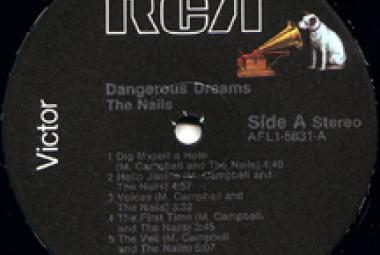Coral Records was a Decca Records subsidiary formed in 1949. It recorded pop artists McGuire Sisters and Teresa Brewer, as well as rock and roller Buddy Holly. It was based in the United States. Various jazz and swing band recordings were issued on Coral in the 1940’s. Coral stopped issuing new material in 1971. In 1973, MCA amalgamated Decca, Kapp Records and Uni Records under the single MCA Records banner; and Coral was repositioned and named “MCA Coral” as a mid-line and budget album reissue label in the U.S. that lasted into the 1980’s. (More from Wikipedia)
Buddy Holly and his band – by now known as the Crickets (they noticed crickets chirping in the studio one time while they were recording, or so the film The Buddy Holly Story maintains) – then began working at Norman Petty’s studio in New Mexico, concentrating in particular on what they considered their strongest song, “That’ll Be the Day” that they had never been able to satisfactorily record in the Decca studios. The recording was brought to the attention of Bob Thiele, an executive at Coral Records; though Thiele liked it, others at Coral were unenthusiastic.
Nevertheless, in March 1957, the Crickets signed with Brunswick Records. In order to avoid problems with Decca Records – even though Brunswick was a Decca subsidiary – Buddy Holly was not listed as a member of the Crickets on the original recording contract. Not surprisingly, this would create serious legal and financial problems for Buddy Holly in the future.
According to Norman Petty, “That’ll Be the Day” by the Crickets was released in May 1957 to “humor” Bob Thiele. The song became a #1 hit that summer; and before long, the jig was up as Decca Records executives realized that Buddy Holly was their bandleader. However, as Cyndi Lauper observed in her 1984 hit song, “Money Changes Everything”, so Decca Records released Buddy Holly from his original contract restriction. As a condition though, Buddy Holly was signed individually to Coral Records (yet another Decca subsidiary); thus, Buddy Holly was in the unusual position of being bound by two recording contracts at the same time – his earlier contract as a member of the Crickets and this new one as an individual artist.
Holly released just three albums during his lifetime, all under different names: The Chirping Crickets by the Crickets on Brunswick Records in 1957; Buddy Holly by Buddy Holly on Coral Records in 1958; and That’ll Be the Day by Buddy Holly & the Three Tunes on Decca Records, also in 1958. The latter album was an attempt by Decca to cash in on Holly’s fame by releasing the songs from Buddy Holly’s 1956 studio recordings from his original contract with Decca.
(June 2013/1)















